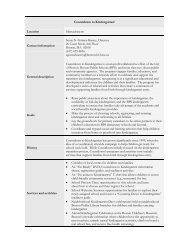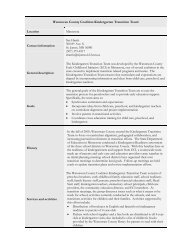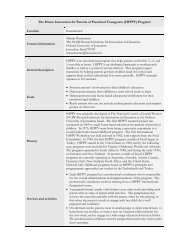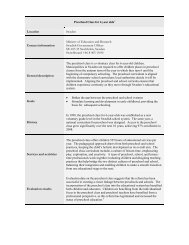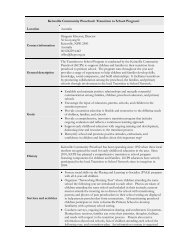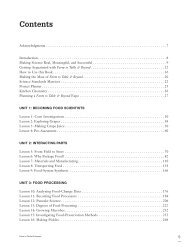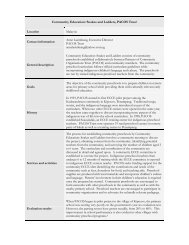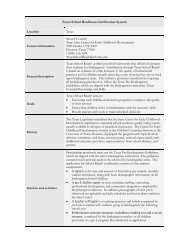Proceedings of the Fourth Annual Teachers College Educational ...
Proceedings of the Fourth Annual Teachers College Educational ...
Proceedings of the Fourth Annual Teachers College Educational ...
Create successful ePaper yourself
Turn your PDF publications into a flip-book with our unique Google optimized e-Paper software.
#phdchat: a community <strong>of</strong> practice on twitter<br />
sava saheli singh,<br />
NYU, 82 Washington Square East, 6th Floor, New York, NY 10003,<br />
Email: sava@nyu.edu<br />
Abstract: Twitter is <strong>of</strong>ten considered a place for frivolous conversations and people<br />
talking about what <strong>the</strong>y’re eating. Not a lot <strong>of</strong> people see it as <strong>the</strong> setting for building<br />
robust and engaging Communities <strong>of</strong> Practice (CoP). #phdchat is one such community <strong>of</strong><br />
PhD students who find solace in each o<strong>the</strong>rs’ company and support – something <strong>the</strong>y<br />
don’t always get in <strong>the</strong>ir physical settings. Ga<strong>the</strong>ring around <strong>the</strong> hashtag, this community<br />
“meets” online on Twitter every week for discussions about <strong>the</strong> practicalities <strong>of</strong> being an<br />
academic, challenges with emotional and mental well-being, and also to share useful<br />
resources. This presentation provides a comparison and contrast <strong>of</strong> #phdchat as a CoP,<br />
with a discussion on a methodology for examining such a community.<br />
“On <strong>the</strong> web” has increasingly become where people go to hang out, learn, consume, and connect. Digital<br />
and social media tools have changed <strong>the</strong> way we interact with <strong>the</strong> world, allowing communities to find<br />
each o<strong>the</strong>r through shared interests and a need to connect.<br />
Online communities have existed since <strong>the</strong> internet has and have taken many forms – from usenet<br />
groups, forums, email newsgroups, and IRC to today’s social network sites like Facebook, Tumblr, and<br />
Twitter. These are examples <strong>of</strong> what Howard Rheingold (1993) calls “virtual communities”, which exist<br />
beyond location and time.<br />
Communities that ga<strong>the</strong>r around a shared interest or practice, form Communities <strong>of</strong> Practice (CoPs)<br />
(Lave & Wenger, 1991). The web provides new ways for <strong>the</strong>se communities to come toge<strong>the</strong>r through<br />
online mediated environments, beyond geographical and physical constraints.<br />
Even though Twitter is sometimes dismissed as a tool that encourages frivolous conversations ra<strong>the</strong>r<br />
than meaningful interaction, <strong>the</strong>re are robust communities who use it on a daily basis to connect,<br />
collaborate, and commiserate. Twitter is used for everything from a marketing tool and a news outlet to an<br />
educational tool used in classrooms and to connect educational communities beyond <strong>the</strong> classroom.<br />
In many advanced degree programs, students live in a vacuum. They have <strong>the</strong>ir smaller communities<br />
consisting <strong>of</strong> advisors and cohort members, but <strong>the</strong>re is <strong>of</strong>ten a lack <strong>of</strong> extended input from <strong>the</strong>ir larger<br />
pr<strong>of</strong>essional community. PhD students have a unique academic journey and <strong>of</strong>ten find <strong>the</strong>mselves<br />
isolated from friends and family, with little in <strong>the</strong> way <strong>of</strong> support and encouragement. This isolation can<br />
also give rise to more serious issues like lack <strong>of</strong> motivation, self-doubt, impostor syndrome, and<br />
depression. Surprisingly, despite constraints, Twitter affords a way for PhD students to find a community<br />
that understands and relates to <strong>the</strong>ir experiences.<br />
Communities on twitter <strong>of</strong>ten identify <strong>the</strong>mselves or ga<strong>the</strong>r around “hashtags” – a user-created way in<br />
which to tag or contextualize tweets in order to follow, archive, or provide commentary. This paper<br />
focuses on a particular CoP: PhD students, who ga<strong>the</strong>r around <strong>the</strong> hashtag #phdchat.<br />
The #phdchat community conducts a weekly “online meeting” on Twitter around <strong>the</strong> hashtag #phdchat<br />
during which <strong>the</strong>y discuss a pre-decided topic that <strong>the</strong> community voted on. They share experiences, tips,<br />
advice – <strong>the</strong> kind <strong>of</strong> knowledge-sharing rarely possible within <strong>the</strong> small cohorts <strong>of</strong> PhD programs. And <strong>the</strong><br />
community extends beyond just this time frame – using <strong>the</strong> #phdchat hashtag allows members to notice<br />
and respond because <strong>the</strong> hashtag identifies you as part <strong>of</strong> that community.<br />
62



